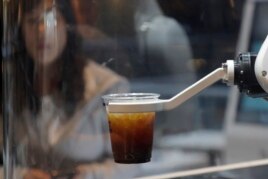09 June, 2019
Are you ready for a robot to serve you coffee?
At a Dal.komm Coffee shop in Seoul, a robot takes orders from you through a mobile app or a touch screen and then makes fresh coffee. The robot can make up to 14 drinks at a time.
Choi Eun Jin thinks the process is fun and easy. The 30-year-old office worker said, "The area is crowded with office workers and local residents during lunchtime. So it's good to have a robot like this ... so you can get your coffee more easily."
Coffee is just one of the many industries that use automated services in this technologically forward-thinking nation. Others include restaurants, food stores, banks and manufacturers. The development comes as many Koreans, especially the young, are struggling to find work.

In this May 22, 2019, photo, a customer waits for a coffee in front of a robot named b;eat after placing an order at a cafe in Seoul, South Korea. (AP Photo/Lee Jin-man)
Just this week, workers who operate about 2,500 large cranes at building sites went on strike. They were protesting the growing use of robotic small cranes for building. Other labor unions also have protested about the use of automated devices instead of human workers at Emart, South Korea's biggest food store group.
South Korean officials also changed plans to completely automate the nation's road fee collection system. They acted after receiving criticism for cutting 6,700 jobs. Instead, the system will be partly automated and keep all its current human fee collectors.
South Korea has been an early adopter of automation. It had the highest percentage of robots to human workers in the world in 2017.
The International Federation of Robotics say South Korea has 710 robots for every 10,000 manufacturing workers. The international average is 85 robots per 10,000 employees.
South Korea's lowest permitted worker wage has increased by 27.3 percent over the last two years. This has led more businesses to cut labor costs by using automation, says Suh Yong Gu of the Business School at Sookmyung Women's University in Seoul.
Even with the job losses, South Korea's businesses are replacing employees with automation and young people are welcoming the change.
Suh said, "Currently, Millennials — those who were born after 1980 — are prime consumers. This generation tends to not like meeting other people, so they favor ... technology that enables people to minimize face-to-face interactions..."
At the recently opened LAB101 store, customers can open the door with their credit cards 24 hours a day. Once inside, they can try on jeans and pay for the purchase without having to deal with an employee.
"I can freely look around and try on jeans as much as I like without being bothered," said Kim Kun Woo who is 29.
Back at Dal.komm Coffee, a robot can make about 300 cups a day at the cost of $2 to $3. While some customers like the robot barista, others do not.
"Personally I prefer human baristas," said Lee Sang Jin. The 30-year-old office worker added that the robot cannot make custom drinks as well as a human. "I like weak coffee, but the robot is unable to control the strength of the coffee well," Lee said.
I'm Caty Weaver.
Hai Do adapted this story for Learning English based on Associated Press reports. Caty Weaver was the editor.
Write to us in the Comments Section or on 51VOA.COM.
________________________________________________________________
Words in This Story
resident - n. someone who lives in a particular place
lunchtime - n. the time in a middle of the day when people usually eat lunch
consumer - n. a person who buys goods and services
minimize - v. to make something not wanted as small as possible
bother - v. to take the time to do something
barista - n. someone who makes and serves coffee